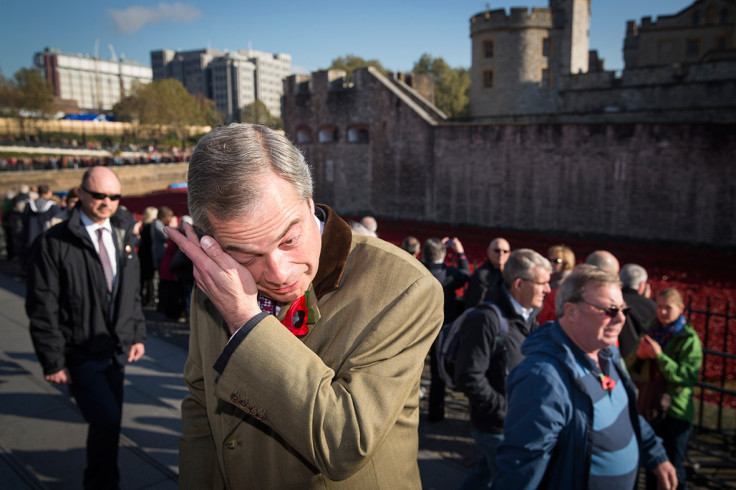Armistice Day: Ukip's Nigel Farage Denies Nationalism to Blame for WW1 Slaughter

Ukip leader Nigel Farage has claimed the Euro has created a new Berlin Wall in Europe, replacing the old east-west divide with a north-south schism across the continent.
Farage made the claim in a speech at St Bride's Church on London's Fleet Street on 10 November, to commemorate the First World War and discuss the legacy of the conflict in Britain and Europe.
The former Conservative politician also claimed that the European Union was based on a huge political mistake, and could sow the seeds of future conflict in Europe.
Farage said: "Europe was divided east to west by the Berlin Wall, and we have just celebrated 25 years of that wall having gone.
"Europe is now split north-south, and it's split by something called the Euro. It doesn't work, and it isn't going to work.
"I'm afraid four or five Mediterranean countries are heading for social disaster, and that is where I see unrest coming from, and I view it as a tragedy."
Turning to the EU, of which he is one of Britain's most high-profile critics, Farage said: "My feeling is that the architects of the modern Europe in the 1950s drew the wrong conclusion.
"They concluded that if we abolished nation-states in Europe there would be no war, and the reason that wars existed was because nation-states existed. The political project since then has been the eradication of the nation-state.
"I think that was hugely mistaken. I don't think the existence of nation-states has led to war; it has been the lack of democracy, or the breakdown of democracy, that has led governments to expansionism and thus to wars happening. I can't think of an example of mature European democracies fighting each other, they don't.
"I think the attempt, without the consent of the people, to effectively corral people in a new state, far from giving us peace and harmony in Europe, is actually likely to stir up the sort of nationalism, and extremism, it sought to eradicate in the first place."
'We will fight for our right to self-determination'
Farage used the Balkans, whose individual nation-states were merged into a single country after the First World War, to illustrate his point that the removal of national sovereignty can lead to long-term tension and turbulence.
"I'm not pretending that anything in the EU will happen that's as horrible as what happened in Yugoslavia," Farage said. "But I am suggesting that in our own ways, we will fight to get back our rights of national self-determination.
"The future of Europe, the future of France and Germany, the future for all of us in this part of the world, a Europe of solid nation-state democracies that trade with each other, and co-operate with each other, there'll be no more First or Second World Wars."
Referring to the rise of right-wing parties such as Golden Dawn in southern Europe, Farage continued: "The conclusion we've drawn from the two wars is the wrong one, and it will lead to a Europe of disharmony, and I think that disharmony or extremism... you've only got to look at parts of the Mediterranean to see what will happen."
Farage, who complained over the weekend that the government "snubbed" Ukip by not inviting the party to lay a wreath on Remembrance Sunday, spoke passionately about his interest in the conflict, and described the poppy installation at the Tower of London as a "huge success" which has "captured the mood of the nation."
© Copyright IBTimes 2025. All rights reserved.





















